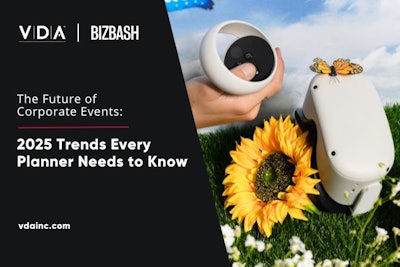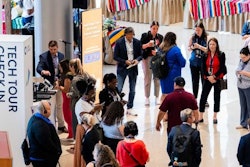The experiential marketing industry continues to grow. As event professionals, we must adapt and grow with it. Below, the team at experiential event-design agency VDA has identified the current trends in the industry that are on the rise, and will be key adaptations for 2025.
Sustainability
Over the last decade, sustainability has become a main concern of adults with buying power. According to the
World Economic Forum, 67% of Millennials and Gen Z prefer to purchase from sustainable brands and services. In this industry, there are many aspects that negatively affect our environment and produce excessive waste: The typical conference attendee produces roughly
four pounds of waste per day. For a 1000-person, three-day event, this translates into 12,500 pounds of waste.
Applying sustainable practices to your event production is something that requires a continued commitment from your organization. A few tactics include designing events with reusable materials for future events and optimizing energy consumption with renewable energy sources. Minimizing the distribution of single-use plastics and prioritizing local food vendors with plant-based menu options can also help to lessen food waste. Providing public transport options will additionally aid in achieving sustainable travel to and from your event, especially for events with large turnouts.
Smaller, Local, and Regional Events
Brands are shifting toward smaller, more localized events in response to travel costs, environmental concerns, and regional business needs. With a more local, intimate experience comes increased focus, fostering deeper connections with specific communities. Specialism and smaller, more targeted audiences provide advantages in relevance, efficiency, and a more direct feedback loop from consumers, delivering better ROI for companies.
Utilizing Personalization and Data
Generally speaking,
81% of consumers express a preference for personalized experiences and find the experience more memorable, which is why event professionals are finding new ways to tailor experiences to create a deeper connection with attendees. The usage of data analytics and AI can help to create more tailored and personalized experiences. In addition, real-time feedback and customization will enhance attendee engagement and content delivery.
Immersive Experiences
It is becoming increasingly difficult, in the age of social media and instant gratification, to keep your attendees engaged for multi-day conferences. Immersive technologies like AR/VR, interactive installations, and sensory-rich environments will redefine these experiences. Providing a sensory-rich experience at your event allows consumers to become fully immersed in your message. These experiences create deeper connections between attendees and event content, making them feel more engaged and involved.
Inclusive and Accessible Design
As diversity and inclusion continue to be key priorities for event planners and the vast variety of attendees coming through your event doors, event design must focus on creating accessible environments for those with disabilities. Ensuring that there are multi-language support services offered is key to providing an accessible experience. Event spaces should be designed with universal accessibility in mind, including easy-to-navigate layouts, closed-captioning, and sensory-friendly options for attendees with varying mental and physical abilities.








![David Monn Higher Res 1[34]](https://img.bizbash.com/files/base/bizbash/bzb/image/2024/12/DavidMonn_Higher_Res_1_34_.675332096a226.png?auto=format%2Ccompress&fit=crop&h=167&q=70&w=250)











